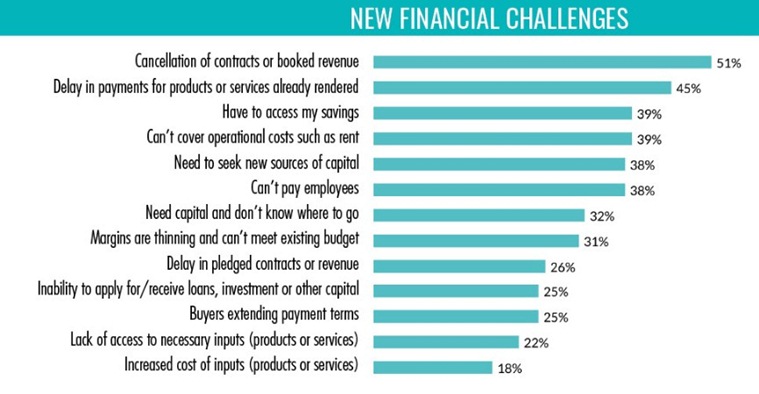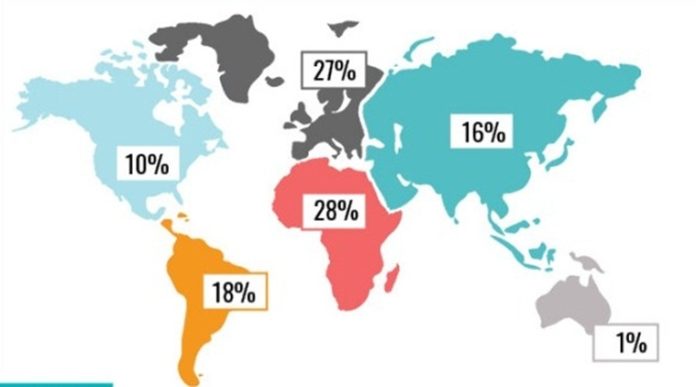New Delhi (NVI): Coronavirus outbreak has impacted women business owners and their companies worldwide, according to a survey which shows the effect of the Covid-19 pandemic on various sectors where women are engaged or in control of respondents in the study.
The survey has been conducted by WEConnect International, a non-profit organization, connecting women’s enterprises with global opportunities.
Out of total 590 respondents from various Industry sectors in the survey, 97% are at least 51% owned, managed and controlled by one or more women.
Among different industry segments, 3% of the business owned by women in the Construction and Food Services sector has been affected amid Covid-19, 5% in Travel/Tourism, 4% in Human Resources and 3% in Health Care.
Apart from that, 2% of Wholesale Trade where women are engaged has been affected, 11 % in Manufacturing, 7% in Food/Beverage, 5% in both Education and Business Support, 8% in Technology Service, 1% in Utilities, 2% in Architecture, 24% in Professional Services and 9% in Others.
As per the January to March findings of the survey regarding the impact on business from Covid-19, 43% of respondents are losing customers as face-to-face business goes digital.
While 35% can’t move inventory that is sitting idle due to decreased demand, 34% feel that increased anxiety about the situation has reduced their productivity/time spent on business.
The report says that 31% of respondents faced inability to source raw materials and inputs for their products due to supply chain disruptions. 27% said that employees can’t work causing delays in meeting client needs.
Another 27% were of the view that increased care demands from children, elderly and other loved ones have reduced the time they spend on their business.
19% feel that they need to shift to digital business but not sure where to start. 10% are not sure where to go for advice and guidance.
In 36% of other cases, client and partner shutdowns due to pandemic have led to a trickle-down effect.
The survey further states that 90% of women business owners have seen a significant decrease in sales or revenue from January-March 2020.
77% of them have anticipated decreased sales between April and July 2020. Among them, 55% anticipate decreases of more than half and 23% anticipate that sales will stop completely.
The global pandemic has also thrown new financial challenges at women entrepreneurs and business owners. 56% of respondents in the survey are in need of support with their employee wages. 76% need tax relief through delayed or canceled payments. While 39% of respondents are in need of extensions of credit or penalty waivers from banks, 22% are in need of government-funded healthcare for Covid-19.

Some other challenges for women business owners amid Covid-19 that require immediate concern are:
1. Adjusting products or services to remain relevant in response to economic changes.
2. Securing funding to remain operational
3. Funding for the organiation to remain fiscally stable
4. Adjusting delivery of products or services at a time of social distancing
5. Directly responding to or supporting customers, suppliers and other critical businesses and partners dealing with the crisis.
6. Responding to immediate potential or actual health needs of employees
However, on a brighter side, women are adapting to optimise or refocus on their businesses. According to the survey, 54% reported identifying and cutting unnecessary expenses. 42% have shifted to a digital business model. 32% are creating a new business line in response to local or global needs.
16% have launched a new product or service early. 3% found that their clients want to move quickly to sign contracts and 5% want to finish projects more quickly. 11% have seen an increase in demand of products or services. 34% have identified new business opportunities. 37% are growing an area of business in response to local or global needs.
Coronavirus outbreak, which started from Wuhan in China in December last year, has left the global economy devastated under its impact, with markets across the world bearing the brunt. People in the tourism, aviation and hospitality sectors have lost jobs while businesses and startups in countries like the US have faced the heat of the pandemic.








